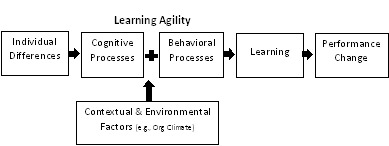For the last few months, I have been nibbling around the edge of learning agility in this column. I wrote about an aspect of learning agility as seen in the movie, Bridge of Spies. I described another aspect of learning agility in comparing my experiences in two different countries in Asia. Some things have come in to focus for me, and I believe I need to take a more direct and in-depth approach to this thing called learning agility.
My firm, EASI Consult, entered into an agreement recently with Warner Burke, Ph.D., to represent a test he created and validated called the Burke Learning Agility Inventory. Burke is Thorndike professor of social psychology at Teachers College, Columbia University and I have known him for 30 years. I also am an alumnus of Teachers College.
People who work in psychology and talent management have believed for some time that your highest-potential employees are the ones who are the best learners. The problem was that no one had been able to measure learning agility
Burke and I had a conversation about six years ago about an organization that had tried to measure learning agility and failed miserably. Burke said something along the lines of, “I think I can measure it, and am going to undertake an effort to do it.” I told him that when he got there, my firm, EASI Consult, would like to collaborate with him. About six months ago, Burke contacted me and said, “We have the questionnaire with the reliability.” Burke and EASI have been working together on this project ever since.
There has been a lot of research and a number of articles written about learning, learning ability and learning agility. Burke’s work was most influenced by the research of Scott DeRue, Susan Ashford and Christopher Myers in 2012 at the University of Michigan. DeRue and his collaborators say that individual differences set the stage for learning agility. This includes things such as goal orientation and openness to experience. Learning agility itself is a combination of behaviors. These are in turn affected by contextual and environmental factors (climate and culture), and these variables lead to learning and performance.
So the diagram to describe this idea looks like this:

Burke developed and validated a test that established nine different dimensions constituting the cognitive and behavioral processes that make up learning agility. The nine dimensions are:
YMCA Eyes Growth With Plans For New, Expanded Facilities
Emma Dill
-
Apr 23, 2024
|
|
Burns, Redenbaugh Promoted At Coastal Horizons
Staff Reports
-
Apr 23, 2024
|
|
Cold Storage Developer Sets Near-port Facility Completion Date
Audrey Elsberry
-
Apr 24, 2024
|
|
Wilmington Financial Firm Transitions To Wells Fargo's Independent Brokerage Arm
Audrey Elsberry
-
Apr 24, 2024
|
|
Krug Joins Infinity Acupuncture
Staff Reports
-
Apr 23, 2024
|
|

“My mission and my goal is to take my love of marine science, marine ecosystem and coastal ecosystems and bring that to students and teacher...

Lydia Thomas, program manager for the Center for Innovation and Entrepreneurship at UNCW, shares her top info and tech picks....

W.R. Rayson is a family-owned manufacturer and converter of disposable paper products used in the dental, medical laboratory and beauty indu...
The 2024 WilmingtonBiz: Book on Business is an annual publication showcasing the Wilmington region as a center of business.
